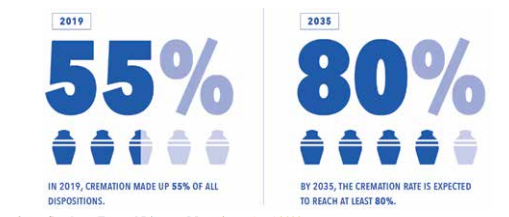(404) 312-6640
The Cost of Waiting - How to Avoid Losing Funerals to Direct Disposition
You’ve probably had them in your funeral home. Families who are grieving the loss of a loved one and don’t already have a plan in place. You notice how they react when you use the word funeral, and they’re looking for whatever is quickest and cheapest.
For funeral homes across the nation, this shift in consumer norms is concerning. A growing number of families just don’t seem to value funeral service like they used to. Trying to reverse these trends feels like an enormous task, one which would require a concerted effort across the entire profession. However, there’s a surprisingly simple solution, and it’s right in front of our eyes.
Getting to the bottom of the problem
It’s no secret that cremation rates are on the rise. By 2035, NFDA expects cremation to make up 80% of dispositions. Many would point to this statistic, along with the rise in direct disposition, as evidence for declining average funeral values. But like so many outward symptoms, the underlying cause is more complex.
Research shows a strong correlation between the increase in direct dispositions and the rise of the religiously unaffiliated, who now make up 29% of the U.S. population. This is compounded by the growing geographic distances between family members. With fewer community and institutional ties, families are increasingly left to define funerals for themselves.
And without clarity about meaning and value, the default becomes commoditization and convenience.
How this affects your funeral home
The direct effects of these consumer shifts are already quite familiar to funeral home owners.
First, there is the challenge of slimmer margins. Direct disposition costs less than a traditional funeral, and as more families choose this option, it leads to declining average funeral values. Then there is increased competition from direct disposition providers, which impacts market share and makes it even more difficult to stand out as a brand. Even with improved marketing, funeral homes struggle to reach beyond those families who already value funeral service.
On top of this, there is the increased cost of running a business. 66% of small businesses across the country report that finances are a challenge, with 43% saying the biggest challenge comes from operating expenses. Taken together, it’s not hard to see what this all adds up to. Unfortunately, the two most common solutions used by funeral homes sidestep the core problems.
Why improving the at-need experience is not the only answer
Providing exceptional service to families is at the center of funeral home strategy.
You know just how much work goes into doing whatever it takes to help families. Few professions are as focused on their customers. So, it’s only logical that improving at-need experiences is the first step funeral homes take to grow their businesses.
Whether this includes a major renovation or adding the latest technologies, the goal is to create a perfectly tailored experience that helps differentiate you from other full-service brands. When done well, this adds tremendous value. Your funeral home builds loyalty and brand equity through positive word-of-mouth marketing.
The problem is you’re primarily reaching families who already value funeral service.
So many funeral directors continue to hear, “We just want a simple cremation” as they’re sitting across from families in beautifully renovated new meeting spaces. Maybe you already know how this feels. There is very little you can do to change someone’s mind after it’s already been made up. This holds true whether you’re trying to convince a friend to go out for sushi after they’ve already decided on pizza or you’re helping someone grapple with life’s most difficult decisions.
But what if you could educate families and share your story before they ever set foot in your funeral home?
Speak to families when they’re ready to listen
Some of the most meaningful innovations started with one simple question: What if…?
For example, what if your funeral home could reach more families in your market who did not fully understand or appreciate the value of funeral service? Your first concern might be to make sure you do this consistently. But the even deeper priority might be to figure out how to effectively connect with and educate these families.
What if you could inspire each of them to shift their perspective about funerals?
It’s common for funeral professionals to say that a funeral is for the living. Yet so many families forget this. They think a funeral is mainly about disposition. What this means is that you have an opportunity to provide an experience with the potential to be transformative. An opportunity for individuals to consider their own mortality and to step into the shoes of their grieving loved ones who will need meaningful connection and healing.
When you create an experience both educational and remarkable, consumer norms can change.
You already have the solution
The fact is, your what-if already exists.
It is something you’re probably already doing at your funeral home. In the past, this what-if was dismissed as an accessory, an underutilized tool to offer families who proactively sought it out. But its potential is extremely powerful.
I’m talking of course about preneed. The real purpose of preneed is frequently misunderstood. It is not simply a sales tool to secure future business, but an opportunity to create meaningful connections with families and make a lasting impact on their lives. It’s your funeral home’s most effective forum for sharing the value of funeral service.
More than anything, the preneed conference is where you can begin to change people’s minds.
When families willingly raise their hands in response to preneed marketing, they’re curious and ready to listen. They may have assumptions about what a funeral is like at a funeral home. But they’ll soon learn the truth—that your funeral home provides a space for ceremony, gathering, and connection that will be crucial to healing after a loss. They’ll listen because they’ll come to believe in what you do.
The case for being proactive
Being passive is no way to advance a purpose you believe in. This is why preneed needs to be proactive. If you want to speak with more families when they’re ready to listen, it starts with more effective marketing. This expands brand awareness and increases your reach. Yet to provide more remarkable brand experiences, advance funeral planners need more effective support so they can spend more time connecting with families.
How this plays out at a funeral home might go something like this:
An average advance funeral planner at a 400-call funeral home might annually reach 160 families. But with proactive marketing and follow-up support, they might reach upwards of 400 families. This more than doubles the number of families who will learn about the value of funeral service and develop a personal connection to your funeral home.
The point here is not to write more preneed just to write more preneed. It’s to write more preneed for a purpose. Funeral home owners who discover preneed’s potential typically want to reach more families immediately. They want their programs to grow because they understand the opportunity to share a message they value and believe in.
But it takes care, effort, and time to get it right. Delivering a meaningful preneed experience from beginning to end is something we’ve spent the past 18 years crafting, and we’ve learned that every step of a family’s preneed journey matters. That’s the only way to ensure the preneed experience is consistently meaningful and remarkable.
Conclusion
Innovations in funeral service have always been driven by the needs of families. This has resulted in everything from funeral coaches to live-streamed funerals. But when the collective assumptions about funeral service change, it’s crucial that we change too. As a profession, we know we can no longer assume that families automatically value funeral service. Instead, it’s up to us to educate families and build value for ourselves.
The fact is, families still want meaningful experiences that help them remember and honor their loved ones. What we can do is tell the story of why this is exactly what your funeral home provides at a time when families are ready to listen.
Tyler Anderson is VP of business development at Precoa, a preneed company that has helped hundreds of funeral homes grow their businesses with an end-toend sales and marketing program. Born and raised in the funeral profession, Tyler appreciated the importance of ceremony and ritual from an early age. He is passionate about sharing a new vision for preneed that emphasizes the importance of experiencing a meaningful service.






Comments